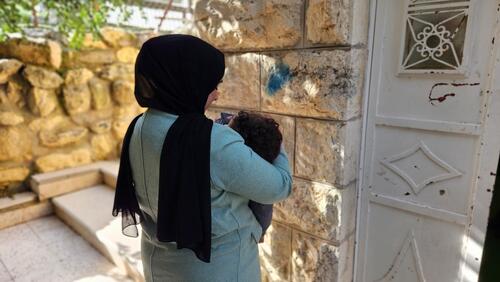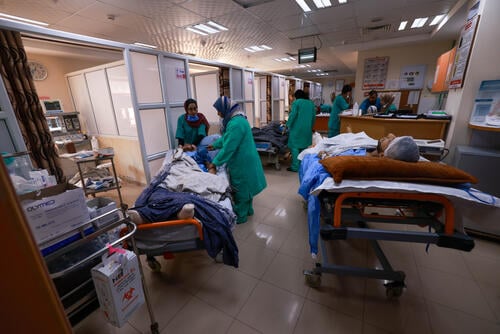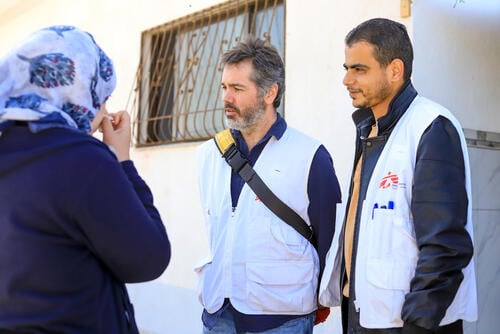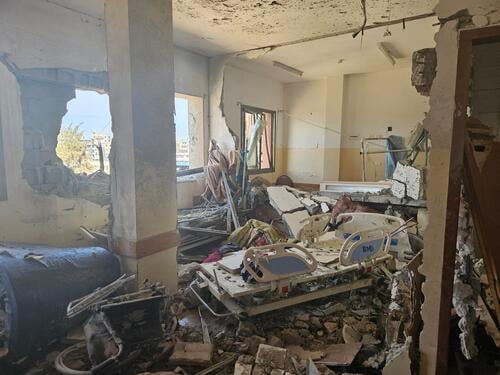“The situation has been bad for years here. Israeli soldiers search our houses day and night, vandalise and arrest people without any warning,” says Alma*, a Palestinian woman from Hebron, the largest city in the West Bank, in the Occupied Palestinian Territories, as she describes the situation since the Israel-Gaza war erupted on 7 October.
Alma’s apartment in Hebron was destroyed by Israeli soldiers just a few days ago. “Since 7 October, things have been much worse, there's no mercy. People in my community are deeply affected and live in constant fear,” she says.
I cannot compare the level of intensity today to before [the war]. It’s as if the Israeli settlers and army have no limits.Aliyah*, a Palestinian woman from Tel Rumeida in H2
Increased violence by Israeli settlers and soldiers
Hebron serves as a stark illustration of the Palestinian’s suffering under occupation: a pervasive climate of intimidation and coercion. The daily reality of people’s lives translates into restrictions of movements, forced evictions and displacement, house demolitions, search-and-arrest operations, disruption of schooling and the continuous presence of the Israeli military and settlers.
The recent escalation of the Israel-Gaza war has only exacerbated the violence and restrictions imposed on the Palestinians living in the West Bank. As of 2 January, OCHA has recorded that at least 198 Palestinian households comprising 1,208 people, including 586 children, have been displaced amid settler violence and access restrictions in the West Bank since 7 October.
They represent 78 per cent of all displacements reported due to settler violence and access restrictions since the beginning of 2023.
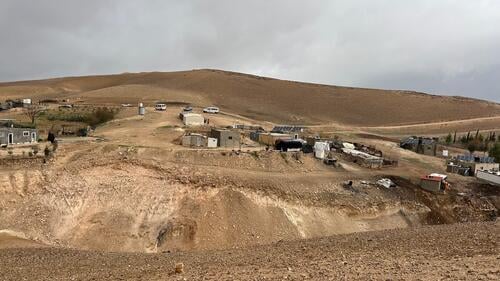
“Immediately after 7 October, we could already see how things took a darker turn. People’s access to basic services, including shops and healthcare, has been heavily restricted,” says Simona Onidi, Médecins Sans Frontières (MSF) project coordinator in Hebron.
“The provision of healthcare was also disrupted. Due to the severe movement restrictions and risk of violence for both patients and medical staff, we observed a 78 per cent reduction of medical consultations performed by our team in October 2023, compared to the previous month,” says Onidi.
In Hebron’s old city, located in the Israeli-controlled area of Hebron known as (H2), restrictions on entry and exit are extremely constrained and unpredictable, impacting all aspects of Palestinians living there.
H2 has long been one of the most restricted areas within the West Bank, with 21 permanent checkpoints operated by Israeli forces that regulate the movement of Palestinian residents and pose significant barriers to healthcare workers trying to access the area.
We are all terrified. People think that the situation in Gaza will happen in the West Bank. Are we next? We just don’t know when.Salma*, a resident of the H2 area in Hebron
In the first weeks following the Israel-Gaza war, Israeli forces further restricted movements, opening the checkpoints only one hour in the morning and one hour in the afternoon, for only a few days a week. At times, Palestinians aren’t allowed to leave their homes for four consecutive days, not even to get the trash out or open their windows.
“I cannot compare the level of intensity today to before [the war]. It’s as if the Israeli settlers and army have no limits,” says Aliyah*, a Palestinian woman from Tel Rumeida in H2.
“I’m pregnant and for example, this morning, the soldiers asked me to pass through the x-ray machine three times [at the checkpoint]. I asked not to go through, for the safety of my baby, but they wouldn't listen – as if they don’t even believe that I am pregnant,” says Aliyah.
“We are all terrified. People think that the situation in Gaza will happen in the West Bank. Are we next? We just don’t know when,” says Salma*, another resident of the H2 area in Hebron.
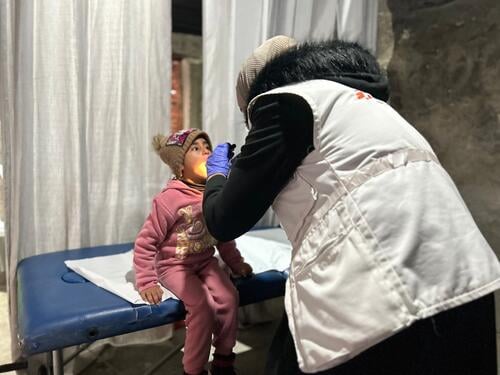
Movement restrictions compromise healthcare
As the disruption to medical access has increased for the past two months due to the movement restrictions and violence, our teams have progressively expanded our response to provide healthcare to people who are unable to reach medical facilities.
As of November 2023, MSF mobile clinics have added six locations to our activities, to reach a total of 10 areas covering the outside and inside of Hebron's old city, but also in the remote villages of Masafer Yatta in the Southern West Bank.
Our mobile clinic teams provide general consultations, reproductive health services, and mental health support. In November and December 2023, we performed 1,900 consultations across these different locations.
“Accessing medical facilities has become ever more dangerous for people with the increase of checkpoints and enforced curfews,” says Juan Pablo Nahuel Sanchez, MSF project medical referent in Hebron.
“At the same time, the provision of medical services has also become more challenging for medical organisations, as movement restrictions have affected healthcare workers’ ability to reach medical facilities. As a result, the provision of healthcare services has been disrupted,” he says.
What is striking here is that we're not only treating post-traumatic stress disorders, but ongoing trauma. Individuals are experiencing exposure to traumatic events daily.MSF psychologist
In the H2 area of Hebron, there is only one medical facility run by the Palestinian Ministry of Health for patients with acute and chronic conditions, but since 7 October staff from the Ministry of Health have not been permitted to access the area, leaving people without healthcare.
For patients with chronic conditions in particular, the lack of follow-up to ensure the continuity of care is a major concern. Now, no other organisation other than MSF can operate in the area.
“No cars, or even ambulances, are allowed inside H2. What if you’re pregnant and about to deliver?” says Nadia*, a resident of H2, Hebron.
“You need to walk to the top hill of the checkpoints and pray that the soldiers will let you pass easily. It isn’t because it's a medical [issue] that you suddenly have rights,” she says.
Outside of Hebron city, in the remote mountainous desert of Masafer Yatta, where people have been under extraordinary pressure from Israeli authorities and settlers to leave the area, evictions, home demolitions and movement restrictions have also intensified since the recent escalation and have drastically impeded people’s access to healthcare.
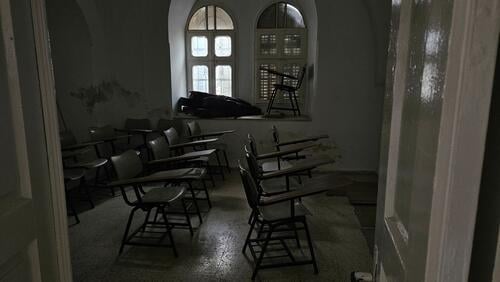
“We are seeing patients who haven't seen a doctor for weeks or months. The most common conditions are respiratory infections and chronic illness. Medication is expensive, but without health insurance, patients have no way to pay for it,” says Juan Pablo Nahuel Sanchez.
In parallel, mental health services including psychological first aid, counselling and psychotherapy continue to be offered to those affected by the situation. Our psychologists are seeing a clear deterioration in people’s mental health.
“What is striking here is that we're not only treating post-traumatic stress disorders, but ongoing trauma. Individuals are experiencing ongoing exposure to traumatic events daily, making it difficult to find relief,” says an MSF psychologist.
The deterioration of people's mental health does not only impact those who are able to grasp the scope and impact of the violence caused by the occupation. Even infants and toddlers are showing symptoms of anxiety, such as bedwetting, nightmares, and isolation.
“It breaks my heart to raise children in this environment,” says Aliyah. “You know what my daughter told me the other day? ‘Mum, I am so scared’ – and she is only two years old”.
*Names of the people interviewed have been changed and other facts that might help identify them have been removed for safety measures.
MSF has been present in the West Bank since 1988, with current activities in Hebron, Nablus, and Jenin. Our teams run mental health programmes with outreach activities, provide medical services and basic healthcare via mobile clinics, as well as capacity-building activities, offering training to health facilities and hospitals for mass-casualty plans, emergency response and patient triage.
In addition to the expansion of medical activities since 7 October, our team increased health promotion activities in the community, and the distribution of relief items, hygiene kits and food parcels to internally displaced Gazans and West Bank residents affected by violence and forcible displacement.




